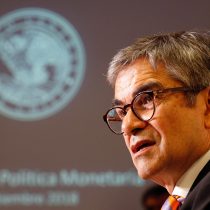
The Chilean economy will expand between 10.5 and 11.5% this year, due to a recovery above the expected impact caused by the coronavirus pandemic, estimated the Central Bank in its Monetary Policy Report (IPoM) of September presented on Wednesday.
But beyond this data, the report presented this morning by the head of the BC Mario Marcel before the Senate Finance Committee launches a severe warning about the progress of inflation and the “risk scenario” in which it puts the Chilean economy new withdrawals of pension savings, just the same day that the Constitution Commission of the Chamber of Deputies must vote in general on the package of initiatives.
In the document, the issuing institute points out that “the Chilean economy has experienced a rapid recovery from the recession caused by the Covid-19 pandemic, a recovery that has far exceeded expectations.”
The Report states that “this has been possible due to the adaptability of companies and individuals and the important progress of the vaccination plan, which has allowed to give way to a broad process of opening up the economy”, added to an international environment marked by the simultaneous action of containment of the crisis.
Therefore, in terms of growth, the estimate raises the projection made in June, where the issuing institute had forecast an expansion of between 8.5-9.5% this year.
The adjustment also forced to change the projections for the coming years. Given the larger basis of comparison, an estimated growth range for 2022 is estimated to be lower (1.5-2.5%). By 2023, “the gradual disappearance of the effects of fiscal policy and the action of monetary policy reduce the estimated growth range for that year (1-2%),” the report states.
However, at the same time, the document warns that “the expansion and persistence of some of the local measures, combined with a high propensity of households to consume the resources received, has had an impact on private spending that has exceeded all forecasts”, thus alluding to measures such as withdrawals from pension funds, and the fourth withdrawal that is voted on today in general in the Constitution Committee of the House.
Rising inflation
On the eve, the agency surprised the market with a sharp rise in the benchmark interest rate to “avoid the accumulation of macroeconomic imbalances.”
The agency set the rate at 1.5% rising 75 basis points, an unprecedented measure to contain prevailing inflation.
In fact, in the IPoM of September, the BC recognizes that “in the central scenario, the annual inflation of the CPI will end the year at 5.7% (4.4% in June), remaining at figures above 5% during the first half of 2022 also explained by the rise in the volatile component of energy and food prices.”
The Bank said it will continue to withdraw the stimulus so that the key rate should return to its neutral level by the middle of the first half of 2022.
Meanwhile, the price of copper would average $4.15 per pound this year, up from $4.25 previously forecast.
Risk scenarios
The September IPoM also identifies internal sensitivity and risk scenarios. “Some of them relate to the future evolution of consumption, which depending on its direction could give way to trajectories that take the TPM in opposite directions with each other, but placing it within the limits of the rate corridor. A further expansion of consumption could result from an even greater propensity to consume resources from pension savings withdrawals than assumed. A less dynamic consumption than expected, on the other hand, could occur if its current dynamism corresponds to an advance of spending decisions or because environmental factors, such as a resurgence of the pandemic, lead households to contain it, “says the report.
Likewise, regarding the fourth withdrawal, the report is emphatic that “the persistent discussion regarding the stability of pension savings ends up significantly altering the functioning of financial markets.”
He adds that “it is very likely that new withdrawals of pension savings, even more the probability of withdrawing 100% of them, will lead the different agents to consider that a structural change is occurring in the savings base of the economy, which has been key to the development of the country, the dynamics of investment and the access of the treasury. to financing at an adequate cost. A change in this direction would cause multiple negative effects that are difficult to quantify, but whose impact will undoubtedly be large and very persistent.”
Regarding this type of scenario, the BC is emphatic and emphasizes that “no central bank has the powers, instruments or resources to neutralize risks of such magnitude and restore macroeconomic balances.”





